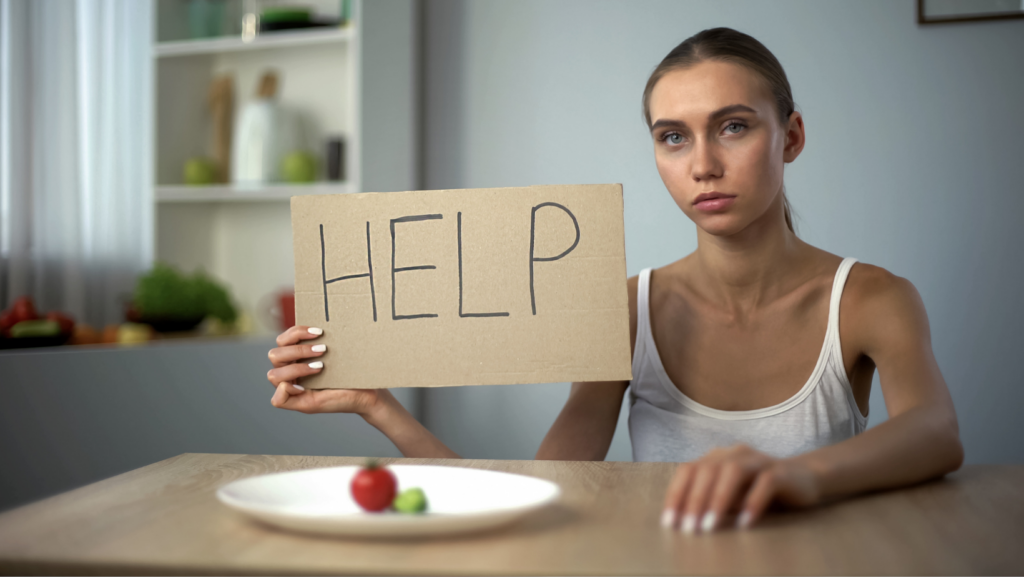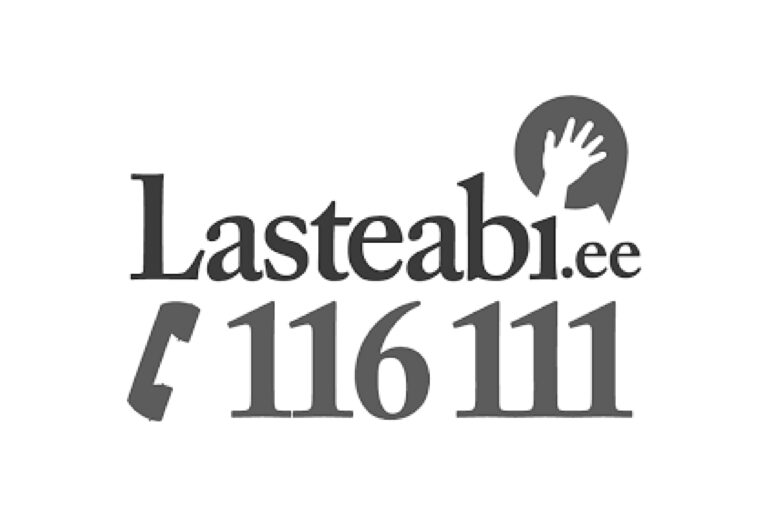Lisbeth’s experience with eating disorders (name changed)
“As soon as I started upper secondary school, I became overwhelmed with responsibilities: long school days, physical training, work. Eventually, I started to measure my worth in achievements […] I could no longer cope with my crippling anxiety, deepening inferiority complex and obsessive need for achievement on my own. I needed a coping mechanism and subconsciously my eating disorder took on that role.
Being slim became my number one priority – everything else was secondary. Before sleep, I watched food videos in bed and scrolled through pictures of underweight models. Anorexia robbed me of my dreams and ambitions: instead of conquering the world, I only wanted to lose more weight. In the end, I was like a ghost on two feet – passive, numb, tired of life.
Just like the body sometimes builds up a tolerance, for example, against a toxic substance, and eventually becomes accustomed to it, I became accustomed to my coping mechanism. When weight loss no longer helped alleviate my anxiety or stress, I found new ways to cope and my anorexia transformed into binge eating disorder and bulimia.”
If you Google the keyword ‘eating disorder’, you will find a lot of informative materials, such as ‘Bulimia – signs and symptoms’ or ‘How to get help for an eating disorder’. Although such information is elementary, it will most likely not have a significant effect on someone who is suffering from an eating disorder. The fact that bulimia can cause serious health problems and help can be found from psychologists is well-known – every young person who suffers from an eating disorder or disordered eating knows that eating disorders are dangerous and help is required. Moreover, ‘get some help’ is a message widely spread by schools, media, friends, and family. Despite that, a recent study found that only 20% of teenagers suffering from eating disorders seek help from medical professionals (1). One might ask “Why?”, but unfortunately, there is no one answer. The answer to that question is likely so complicated that it is easier to just say: “I don’t know.”
Overview of eating disorders
The healthy nutrition website Toitumine.ee says the following about eating disorders: “Anorexia, bulimia, orthorexia, binge eating disorder, and all possible combinations of the above are all psychological/psychiatric problems and can have serious consequences.” One of the risk factors of eating disorders is low self-esteem and a tendency to suppress one’s feelings and emotions.
A strong fear of weight gain is a characteristic feature of most eating disorders. Those suffering from these disorders go to extreme lengths to maintain or lose weight. Below is an overview of the most common eating disorders compiled by the healthy nutrition website Toitumine.ee.
Anorexia – the term anorexia comes from Greek and means a loss of appetite and an aversion to food. The main symptom of anorexia is the desire to be as slim as possible and feeling overweight at any weight.
Physical consequences – prolonged starvation leads to dry skin, brittle nails and hair, cold sensitivity, and disruptions in the menstrual cycle. Anorexia may also cause gastric or peptic ulcers and lead to heart, kidney, and liver failure. In addition, it can also bring about dizziness, fainting, headaches, osteoporosis, anaemia, and infertility.
Bulimia – starts as a form of restrictive eating, may be preceded by anorexia. Those suffering from bulimia are constantly thinking about food. Bulimia is characterised by binge eating followed by feelings of guilt and fear of weight gain. To expel the body of calories eaten from the binging phase, people make themselves vomit or use laxatives.
Physical consequences – bulimia causes tooth decay, periodontal disease, and mouth ulcers. Nutrient deficiencies are also likely to occur. Bulimia can also cause menstrual irregularities and damage to the oesophagus, liver, and kidneys.
Binge eating disorder (BED) – uncontrolled overeating, compulsive eating disorder. Binge eating disorder involves eating much faster than normal until feeling uncomfortably full. People who suffer from BED also eat when they are not hungry and may feel guilty, ashamed, or depressed after binge eating.
Physical consequences – joint pain and digestive issues are common. People suffering from BED are often overweight, which can lead to lifestyle diseases, such as type 2 diabetes, hypertension, high cholesterol, breathing difficulties and malignant tumours. (2)
Why should you seek help?
As mentioned in the introduction, there is a lot of information about eating disorders online, but the main question is not where to get help, but rather why one should get help.
In the article by the Meadows Ranch, it is emphasised that eating disorders may be deeply ingrained in identity – eating disorders typically have their onset during early adolescence, during the years of intense identity development. It may seem like restricting calories or getting rid of them in an unhealthy way helps us to cope with life or maintain weight.
Very frequently, those who suffer from eating disorders say that they could not stop even if they wanted to. Letting go of part of your identity, of your eating disorder – the only thing that provides a sense of security and protects you from anxiety, depression, and stress – seems like an impossible and scary task. What does help then? A strong will and motivation to recover and get your life back. A strong reason can be like a well-packed backpack that nourishes and protects a hiker on a new, unfamiliar road. While no one chooses to have an eating disorder, everyone can choose recovery.
Below are some questions that can help you look deep inside yourself and perhaps lead you on the road to recovery.
- Think back to the time before your eating disorder. What do you miss the most?
- What is the most valuable thing you have lost because of the eating disorder? Does it make you feel sad?
- If anorexia, bulimia, and other eating disorders are your friends, why do they treat you so badly?
- Are you in control of your life and thoughts or has your eating disorder taken them over?
- What are you fighting for? Why are you so fiercely defending such a toxic part of your identity?
- What has the eating disorder given you? Is it worth everything you have lost in the process?
- Who or what is telling you ‘I cannot do it’ and why do you think this is true? Have you tried to do it?
- Has the eating disorder robbed you of your dreams? Is there anything important that you have missed out on because of your eating disorder?
- What is your current goal? What is your ultimate goal that you want to achieve? Is it in line with your dreams before the eating disorder?
How can you free yourself from the shackles of an eating disorder?
It is not easy to find motivation and if it seems like too big a task, a psychologist or counsellor can help you on your journey. You just need to take the first step. Where can you find help?
The website of Peaasi.ee states the following: ‘Do you have a mental health related problem or concern? You don’t know how to move forward or help yourself? Who to talk to or which specialist to turn to? Write to the counsellors of Peaasi.ee! Our counsellors are experienced mental health professionals who will get back to you within three to six days. The response will be sent to your e-mail, i.e. it will not be made publicly available on the portal. To ensure you receive our reply, please make sure your e-mail address is correct. Our principles of confidentiality are based the legislation of Estonia. Counselling is offered free of charge.’ (3)
Sources:
- https://www.waldeneatingdisorders.com/blog/why-arent-teens-seeking-eating-disorder-treatment/
- www.peaasi.ee
Published in the youth information portal Teeviit in 2022.







